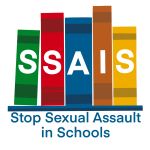by Heidi Goldstein, SSAIS Board chair
 When I tell people that I work on issues of sexual harassment and assault in public schools, they are often surprised to learn that much of the work is focused on the Berkeley Unified School District (BUSD), where I live and my two children attended K-12. How is it, people wonder, that a progressive city like Berkeley can have sexual harassment problems in its schools?
When I tell people that I work on issues of sexual harassment and assault in public schools, they are often surprised to learn that much of the work is focused on the Berkeley Unified School District (BUSD), where I live and my two children attended K-12. How is it, people wonder, that a progressive city like Berkeley can have sexual harassment problems in its schools?
Sadly, Berkeley is a microcosm of a much larger dynamic that regularly plays out in schools across the U.S. Poor policies and processes—implemented by staff who are inadequately trained or supported in their obligations to provide a safe and equitable learning environment, as Title IX requires—result in real damage, trauma and academic derailment to students who suffer incidents of sexual harm.
The first week of February saw significant student turmoil at Berkeley High School (BHS), precipitated by several issues related to BUSD’s years-long failure to adequately address issues of sexual harassment and assault.
The most visible manifestations of the unrest included multiple instances of graffiti around the school naming “Boys to Watch Out 4”—a listing of known student harassers and assailants not unlike the “Shitty Media Men” list that came out during the #MeToo movement.
Highly visible around the BHS campus during February 6’s back-to-school night were flyers which read “BERKELEY HIGH STUDENTS DEMANDS” and included 10 specific demands for changes in the ways the district handles cases of sexual misconduct. Other flyers posted around campus that evening included statistics and facts about the prevalence of sexual harassment and assault.
This same week also included media coverage of a recently-filed lawsuit against BUSD over improper handling of a student’s reported on-campus assault in May 2019; as well as public performances of a student written show called “Our Monologues,” featuring original narratives about the challenges students face around gender, race, sexuality and identity.
Then, on February 11, 1,000 students marched from Berkeley High School to the school district administration building several blocks away and occupied all three floors of the building. Later that day, the superintendent met with student leaders to discuss their demands for increased student survivor support, Title IX oversight at Berkeley high school and changes in the ways BUSD handles cases of sexual misconduct. In response, the Title IX coordinator has provided an action plan for immediate response to key student demands. The district has determined the price tag attached to the student demands to be approximately $360,000 in additional staffing costs but has not yet taken further action on student demands.
There is a common theme to the confluence of these events: Students have grown frustrated with BUSD’s lack of focus, insufficient investment and extremely limited capacity to handle incidents of student-on-student sexual misconduct.
They are angry over the district’s inability to keep targets of harassment safe from physical intimidation and the social retaliation of their peers at school after they reach out for help. They are dismayed by the perfunctory “restorative justice” remediation processes applied to their circumstances as “resolution,” and they are appalled at the absence of consequences or discipline processes to discourage perpetrators from such behaviors. Now, the students are demanding the district change its approach.
Since 2014, when I started working on sexual misconduct issues as a member of the BUSD Sexual Harassment Advisory Committee, and as an adult advisor to the student grassroots advocacy organization, BHS Stop Harassing, there has been little headway or sustained change to improve these dynamics. Incidents occur in grades K-12 every year: Students are hurt, and distracting social retaliation across the student population is rampant. Parents are bewildered as to how to help their children and receive limited guidance from the district in navigating its processes. Every year, some students leave the district because the response to their incident is poor, and supports for success at school are insufficient. Some families sue the district, and win reparations. Most students just tolerate the abuse and don’t reach out for help because they have seen how others before them have suffered from inadequate protections and poor process when they sought help.
It is time to re-examine why BUSD is unable to create a safer, harassment-free environment for K-12 students, why it has yet to develop a robust curriculum to educate K-12 students about the issues, and why it is unable to effectively handle the misconduct issues when they arise. I believe the answer to these questions can be found in the sustained lack of investment BUSD has made in organizational and programmatic support since it was compelled, in late 2014, to admit that it did not have even the most basic infrastructure in place to comply with Title IX and other educational equity laws.
The students at BHS have put out the call for dialogue; their list of demands is the blueprint for the conversation. Next week they will hold a series of walk-outs and workshops with their peers to refine their asks of the district: to improve their learning environment; to provide meaningful access to safety after an incident occurs; and to implement robust, balanced processes for resolution and justice. No one knows better than they what is working and what is not.
District leadership would do well to follow the advice educators often give to failing students: Engage in frank discussions, fact-finding and self-evaluation to understand why they aren’t delivering to the standard. Make a corrective plan, and make a declaration of your intentions to execute on it so others may hold you accountable. The district owes nothing less to the students and families it exists to serve.
Read the full list of recommendations developed by staff members of the BUSD Sexual Harassment Advisory Committee (SHAC) here.
This blog appeared in MS. Magazine.
Heidi Goldstein has served on the Berkeley Unified School District’s Sexual Harassment Advisory Committee since 2014 and is a founding adult advisor to the student grassroots advocacy organization, BHS Stop Harassing. She serves on the advisory board of Stop Sexual Assault in Schools.
